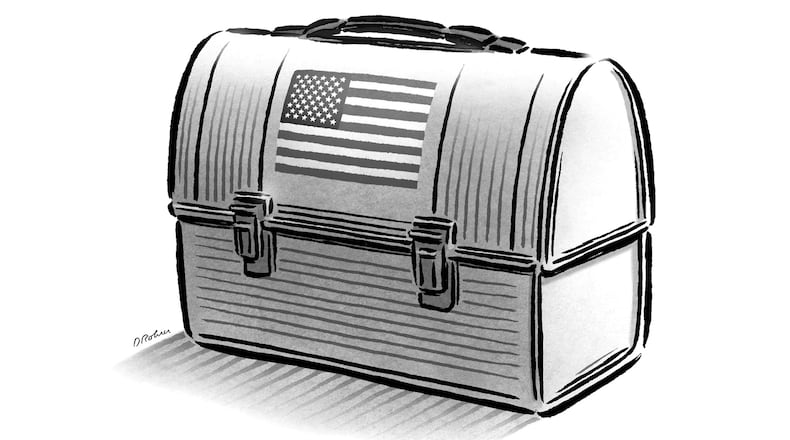This Editorial appeared in the combined The Atlanta Journal and The Atlanta Constitution of Sept. 6, 1971.
If there is one thing the workingman knows, it is that everything has a cost. From the shirt he pulls on in the morning to the bills he pays by check at night, nothing comes free. This is a piece about the costs people have built into his life with cynical skill.
The workingman always has been willing to help the less fortunate. First it was taking care of blood kin. Then the immigrants to these shores set up the ethnic clubs and fraternities that guaranteed a decent burial and a little something for the widow. And in the course of human events the welfare state was born. The workingman joined with management to set aside pension funds, and he joined with government to provide Social Security programs.
Finally the expectations on him came to be crushing. He was vilified by the intellectuals for wanting to stop paying more and more taxes. He was ridiculed by his own young for working hard to pay the taxes that kept our schools open, their free clinics going. He even began to doubt himself whether his values made any sense. They told him that he treated his fellow workers badly, and claimed he had grown even farther away from a peaceful society.
He took all this -- not gracefully, because he didn’t like it, but he hit back only occasionally. And now, finally, some of his fellow countrymen are beginning to stop and think. Their judgments of him are not so harsh. Neil H. Jacoby is one of these. Jacoby is an associate at the Center for the Study of Democratic Institutions, a liberal organization in Santa Barbara, Calif. Jacoby has just published an article in The Center magazine which should be of considerable consolation to the workingman.
“People’s expectations had risen faster than reality could improve,” Jacoby wrote. “Americans have recently demanded social improvements beyond the capacity of this or any other society to produce.”
Politicians and the news media both draw some fire from Jacoby for creating unrealistic goals. He cities Presidential task forces and commissions as especially harmful in this area:
“An instance of headline-grabbing is the 1968 Report of the National Advisory Commission on Racial Disorders, commonly known as the Kerner Report. Although this weighty document contained much wisdom, what stood out when it was issued was the inflammatory headlined statement that “this nation is moving toward two societies, black and white, separate and unequal.’ ... By implying that the Establishment was failing to improve racial relations, and that the racial gap was widening, the Kerner Report added fuel to the fiery demands of militant groups for revolutionary change ...
“Yet the truth is that our democratic political institutions and our market economy, despite imperfections, have been making steady progress in narrowing the economic, educational, political and social inequalities between the races ever since World War II. The median income of nonwhite families rose from 55 percent of that of white families in 1950 to 63 percent in 1968; and, according to figures cited by Daniel Moynihan, the incomes of young black married couples had become equal to those of white young married couples in 1970.
The proportionate reduction in poverty since 1959 has been almost as great among blacks as among whites ... .”
Along with many others, Jacoby has perceived that the expectations in all areas of life have been too vast for the reality. The workingman can’t pay very much more than he has already to build a better society. He is scorned when he says it, but the statistics begin to indicate that he is indeed trapped.
To his credit, President Nixon has begun to tamp down some of the expectations. He did so by freezing wages and prices for three months. And he did so by avoiding another war on poverty or hunger or slums every three months, well in advance of winning any one of the wars already declared.
Nixon did slide into the habit sometimes, as when he pronounced an “American revolution” in shuffling some of the agencies from department to department. His crusade against cancer may have been overdone in terms of political hoopla. Overall, though, Nixon has avoided the worst excess.
The workingman has not been oblivious to the problems. He knows that change must come. He understands that the real conditions of humanity must be improved as quickly as the society can afford it. He wants to see some progress; he has just gotten sick of the expectations running so far ahead of the possibilities of success. He agrees with Jacob in believing:
“Managing public expectations has become a vital new dimension of political leadership in the United States, of coordinate importance with the engineering of orderly reform of our social institutions. Political leaders need to observe expectation-reality gaps constantly in order to maintain the proper state of tension in society. The statesmen of the future will be those who know how to bring about orderly social change and also to keep public expectations in a productive relationship to realities. Thus they will enable our society to resolve successfully a constantly emerging set of new social problems.”
Keep Reading
The Latest
Featured


